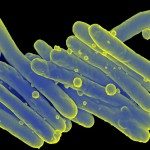Link to Pubmed [PMID] – 16781179
Microbes Infect. 2006 Jul;8(8):2075-81
Buruli ulcer, a disease caused by Mycobacterium ulcerans, is emerging as an increasingly important cause of morbidity throughout the world, for which surgery is the only efficient treatment to date. The aim of this work was to identify potential vaccine candidates in an experimental model of mouse infection. In BALB/c mice infected with M. ulcerans subcutaneously, Hsp65 appeared to be an immunodominant antigen eliciting both humoral and cellular responses. However, vaccination of mice with a DNA vector encoding Mycobacterium leprae Hsp65 only poorly limited the progression of M. ulcerans infection. In contrast, a substantial degree of protection was conferred by subcutaneous vaccination with BCG, suggesting that BCG antigens that are conserved in M. ulcerans, such as TB10.4, the 19 kDa antigen, PstS3 and Hsp70, may be interesting to consider as subunit vaccines in future prospects.


